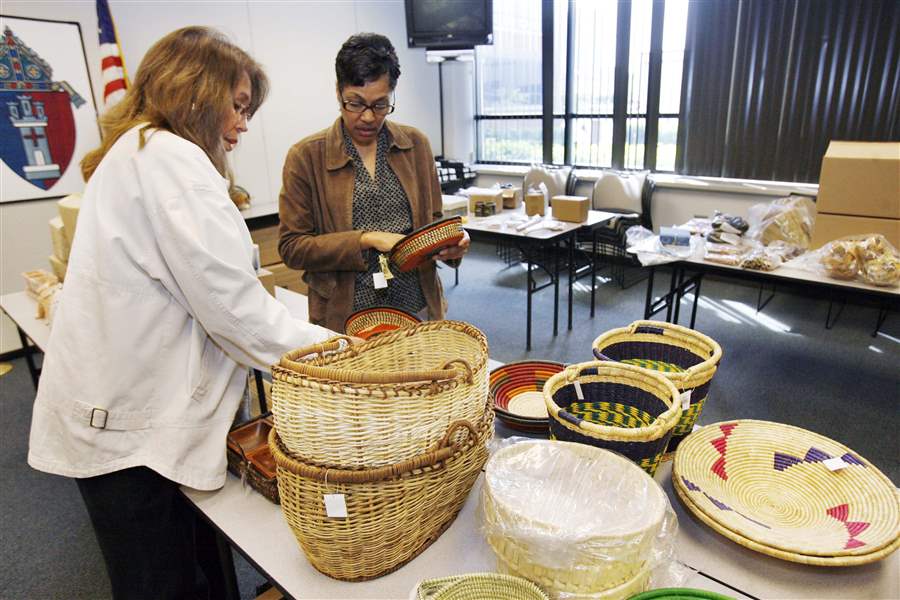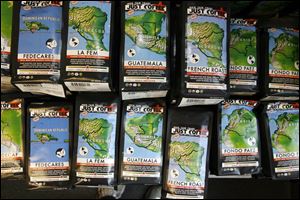
Sale benefits Third World workers
5/9/2009
Theresa Ashton, left, and Tanya Seldon, both of Toledo, examine some of the baskets that were on sale at the Catholic Center this week.
Jetta Fraser

Theresa Ashton, left, and Tanya Seldon, both of Toledo, examine some of the baskets that were on sale at the Catholic Center this week.
There s a price to pay for economic justice, but even in tough times many Americans are willing to dig deeper into their pockets to help those less fortunate by buying fair trade goods.
Coffee, chocolates, hand-made jewelry, clothing, baskets, garden decorations, and knickknacks from Guatemala, India, Indonesia, Cameroon, and other poor nations were on displayed earlier this week at the Catholic Center in downtown Toledo.
The sale was aimed at raising awareness of Catholic Relief Services fair trade coffee products and Work of Human Hands crafts.
This is our third year doing this and it s primarily to help people in Third World countries, said Deacon Paul White, director of the Toledo diocese s Office of Global Concerns.
The overseas growers and artisans can make as much as three times the income for their work when churches, synagogues, and other religious groups sell their products, he said.
It s a little more expensive but it s well worth it, Mr. White said. These baskets made by women in Africa, for example, help raise money for families where there is a huge AIDS epidemic.
The benefits of fair trade programs, which are gaining popularity among many religious groups and secular organizations, outweigh the slightly higher price in the minds of most Americans, said Katy Cantrell, fair trade program adviser for the Baltimore-based Catholic Relief Services.

Organic fair trade coffees from around the world sell in one-pound packages for $7.50.
The fair trade movement has been growing over the years despite the economy, she said. The mission and the message of fair trade still resonates with people even when they are looking at making hard decisions as consumers. Americans find it valuable to help people overseas who don t have it as well as we do.
The World Fair Trade Organization reported in 2007 that the estimated retail value of all fair-trade products sold in the United States tripled from 2004 to 2007, to more than $927 million.
More than 130 U.S. Catholic dioceses held fair trade sales last year, Ms. Cantrell said, helping to boost CRS annual fair trade sales to more than $2 million. And American Catholics drank more than $500,000 of fair trade coffee in 2008.
Monday s sale in the Catholic Center featured tables in a conference room displaying coffee from Nicaragua, Dominican Republic, Guatemala, and Colombia in one-pound bags priced at $7.50.
Divine Chocolates sold for $2 for small bars and $4 for large.
Woven baskets decorated with symmetrical patterns of green or orange were priced at $15 to $20.
Handmade crosses from Jerusalem sold for $20.
One table featured a variety of metal Bombolulu necklaces and bracelets made by handicapped persons in Mombassa, Kenya, on sale for between $10 and $21. A brightly colored wicker birds nest from Bangladesh had a price tag of $13.
Indonesian artisans produced colorful scarves that sold for $18 and bamboo wind chimes priced at $10.
Ms. Cantrell said Catholic Relief Services operates relief and development projects in more than 100 countries. The relief services and fair-trade programs are provided regardless of the ethnicity or religion of those being helped, she said.
The CRS almost always runs the fair-trade projects through partner companies, with the church group s workers dealing with craftsmen and growers to get the products and then partnering with U.S. companies to make them available to consumers, usually sold online or by phone.
It s not eliminating the middleman, Ms. Cantrell said, but it s eliminating the greedy middlemen.
When you talk about a fair price for the crafts, these are very unique articles. They re not what you would find walking into a store. And the quality is very high, Ms. Cantrell said.
Farmers get a higher price for their coffee and people realize it might cost them a little more but on the scale of things, when you look at Starbucks and other higher-priced coffee out there, it falls somewhere between a lot of those prices.
Mr. White said the Toledo diocese seeks to raise awareness of the fair trade and crafts programs and hopes that individual parishes will make an effort to host such sales in their own churches.
Catholic Relief Services has lessened most of the financial risk of putting on a fair trade sale because the items that do not sell can be sent back, Mr. White said.
More information is available online at such sites as crsfairtrade.org and fairtradefederation.org.
Contact David Yonke at:dyonke@theblade.com or 419-724-6154.